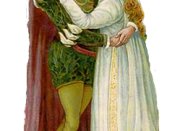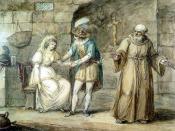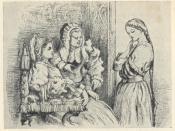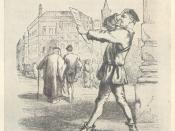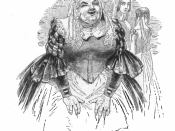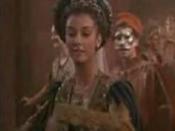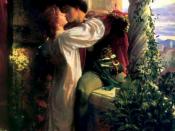In this essay I am going to write about the two lovers, Romeo and Juliet, and how they are fated to die, from the ideas Shakespeare portrays in the play.
One of the most interesting points of the play is that Shakespeare decides to "ÃÂlet-on' to the audience as to what is going to happen at the very end of the play "" in the very first lines of the play. The Prologue: ""æ A pair of star-crossed lovers take their life"æ" This tells the audience that the two lovers, main characters of the play in fact, are going to die no matter what "" fated to die.
Shakespeare may have done this because he feels confident that the play still has enough excitement throughout, and releasing the pressure at the beginning of the play as to what will happen relaxes the audience "" so the lovers can be portrayed as even more romantic.
It points out to the audience that the two characters are also violently in love together, love so violent that they spontaneously put their lives on hold to let their love see through. The prologue: ""æ star-crossed lovers"æ" Some plays will not have a prologue "" but in Romeo and Juliet's case, it has, and it gives the audience a good idea of how the play is going to conclude. This has positive effects on the audience; since they know how it ends, they can concentrate further on the complex characters of the play, furthermore "" which are responsible for their concluding deaths.
The two families, Montague's and Capulet's, have an "ÃÂancient grudge' between them and are usually fighting or arguing over petty disputes. Romeo meets Juliet when he visits the Capulet's party, and later finds out she is a Capulet. From this ironic start the audience can tell that there will be more than an end as the Prologue prophesised"æ it will be a dramatic end. Romeo realised this consequence when he tells Benvolio (a close friend) that he feared entering the Capulet house and enrolling with their party: ""æSome consequence yet hanging in the stars. Shall bitterly begin his fearful date"æ" There are many instances in the play, which reveal that the love of Romeo and Juliet would end in death.
"A pair of star-crossed lovers take their life"æ" From the very beginning it is evident that they were destined by the stars to bad fate. Some people may think that there is no way to control far or change what is in the stars. It could be that the love of Romeo and Juliet was destined for death so that their parent's feud would be over. Also, in the prologue it states that the fearful course of their love was destined for death: "The fearful passage of their death marked love"æ" Both of the quotes show us that the love of these two was destined to end tragically.
Fate is further emphasised when Romeo says that he is "fortunes fool", with his future "hanging in the stars". The feeling of inevitability is being reinforced throughout the play. Everything in the play is predestined, ie: "Star-crossed lovers" and "death-marked love".
And yet, the tragedies could have been predicted: "I fear, too early, for my mind miss-gives, some consequence, yet hanging in the stars" Juliet has an "ill diving soul", and later Mercutio's curse of "A plague o' both your houses" is fulfilled.
There is a sense of irony because fate brought Romeo and Juliet together when Romeo went to the party to see Rosaline: ""ænow seeming sweet, convert to bitterest gall"æ" Tybalt spoke this line when Romeo was outside about to enter the Capulet party, it tells us that the sweet love is to be converted to tragedy for the families.
Fate seems to control the life of the characters in the play: "He that hath steerage of my course, direct my sail"æ" Also: "O I am fortunes fool"æ" The Friar tries to warn Romeo and Juliet of the fate over and over with: "These violent delights have violent ends and in their triumph die, like fire and powder, which, as they kiss, consume"æ" The Friar knows their love is strong, but the fate of their families, not themselves is keeping them apart, and their ending will be as tragic as it started.
Later on, when the Friar has plotted a plan with Juliet to fake her death. He was to deliver a message to Romeo, but this message did not arrive in time for Romeo to understand what had happened when he heard of Juliet's "death".
When Romeo is furious and enraged, he challenges Tybalt to a duel to avenge Mercutio's death. We are never in doubt as to the consequence of this fight for Romeo; he is out to revenge the untimely death of his friend. With Tybalt dead at his feet, Romeo cries out~: "O I am fortunes fool"æ" A statement that ties up with what we heard earlier in the prologue.
Their final moment together is ended with the sun, and a fear of losing each other: "Yond light is not daylight, I know it, I. It is some meteor that the sun exhales to be thee this night a torchbearer"æ" They both knew that staying would mean death. There is irony spoken in their last words to one another, they both have seen each other's death: "O god, I have an ill-diving soul! Methinks I see thee, now art so low, as one dead in the bottom of the tomb." In the middle of her pain for losing Romeo, her mother comes to tell her that she is to marry Parris.
After she says this, she seeks the counsel of the Friar; she threatens to kill herself if he does not help her.
Juliet speaks the line: "O look, methinks I see my cousins ghost" This soliloquy, just before she takes the potion from the Friar is like a premonition. The hate between the two families is so great, and the dead of Tybalt will bring about the destruction of Romeo and herself. She says it as if she does not care if Tybalt's "ghost" sees her drink the potion because it is not her fault to of gotten her in this position.
In Act 3 Scene 5, Juliet says "O god, I have an ill-diving soul". She says this after she says "ÃÂfarewell' to Romeo when he must leave for Mantua. Shakespeare is using fate here because Juliet has realised that a strain of events, brought upon her by her family has caused this tragedy. At this point, Juliet wishes her soul were not apart of her family.
The Friar married the couple in the first place, and he knew that Juliet was due to marry Parris. He did warn both Romeo and Juliet of the consequence of the marriage, but it was not enough to deter them. The Friar also assists Juliet in faking her death "" but this was forced upon him because Juliet threatened to kill herself if he didn't help. The Friar proposed a plan to Juliet, which she accepted, the Friar attempted to send Romeo a message of the plan but it failed to reach Romeo, in time. So in a sense, if this message did reach Romeo, the plan would have succeeded.
The Nurse doesn't add much pressure on Juliet initially, she tries to relieve her. But the Nurse changes her opinion several times in the play after key events, which confuses Juliet. After the argument between Lord Capulet and Juliet, the Nurse changes her opinion and tells Juliet that she should marry Parris. But earlier in the play she arranged the marriage with Romeo. This adds a lot of confusion to Juliet's already complicated life "" and this may have added to her final search to kill herself.
Romeo is impractical and impetuous. Juliet has to point out to him that the marriage must be arranged; yet he is more inclined to talk about his love in raptures. Later he responds to the death of Mercutio, with fury, and ends up killing Tybalt. Romeo was confused and was under increasing amounts of pressure, and did not consider the consequence of his actions. Romeo was not the primary cause of their new fate.
Romeo loses self-control once he realises he is banished, and when his friend comes to tell him of the death of Juliet "" he loses the will to live. He rushes back to the city to see Juliet, only to kill himself as she awakens.
